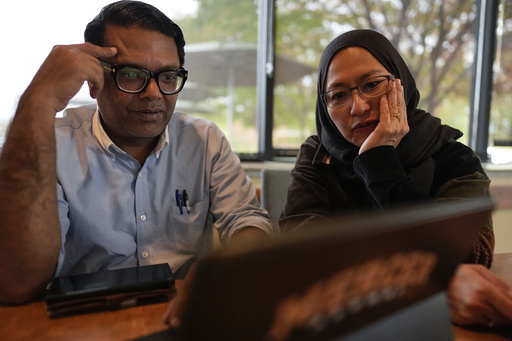
In Atlanta, Soraya Burhani found herself deeply conflicted as she considered her vote in the presidential election, heavily impacted by the ongoing tragedy unfolding in Gaza. “For us Muslims, I see that there’s no good choice,” she expressed, reflecting the struggles faced by many American Muslim voters who overwhelmingly supported President Joe Biden in the previous election.
As the Israel-Hamas conflict weighs heavily on the political landscape, numerous voters from the Muslim community are grappling with their voting options. U.S. support for Israel has left many feeling disillusioned and marginalized, leading some to consider alternatives outside the Democratic Party, with some even contemplating votes for third-party candidates. The looming possibility of another Trump presidency adds another layer of complexity to their decisions.
In presidential swing states like Georgia, where Biden triumphed in 2020 by a razor-thin margin, these voting dilemmas carry significant weight. Shafina Khabani, the executive director of the Georgia Muslim Voter Project, noted the diversity of responses among voters: “Our communities, they’re sad; they’re mourning; they’re grieving; they’re angry and they’re confused,” indicating a departure from previous voting loyalty to a single political party.
Burhani, who identifies as a Malaysian American, ultimately cast her vote for Kamala Harris, but she clarified it was more a move against Trump than a genuine endorsement of the Democratic vice president. It was an emotionally challenging decision, characterized by pain and sadness. She is also involved in a campaign titled “No Peace No Peach,” which calls for withholding votes from Harris unless specific demands—like ending arms shipments to Israel—are acknowledged. The campaign encourages voters to prioritize the Palestinian issue when making their choices.
Others in her community, like Latifa Awad, are opting for the Green Party candidate Jill Stein, wanting their votes to signify that their voices are important. Awad expressed concern that not voting for Kamala would merely support Trump, but she pointed out that both candidates have backed Israel in the ongoing conflict.
Meanwhile, Jahanzeb Jabbar, who supported Trump in 2020, remains firm in his backing for him in the upcoming election. He believes that if the Democrats had taken a strong stance advocating for a ceasefire and halting military aid to Israel, he would have considered their support. Jabbar argues that Trump’s leadership could yield better outcomes for peace, noting the ongoing violence in Gaza has reached alarming levels.
The intensification of conflict followed a brutal attack on Israel by Hamas on October 7, 2023, which resulted in 1,200 deaths and a hostage situation. This situation has significantly altered perceptions of both political parties among Muslim voters, who predominantly supported Biden in previous elections, leading to feelings of betrayal as they witness the escalating violence.
Many in the community are deeply upset with elected officials they had previously supported, feeling that their votes contribute to funding a war that threatens their loved ones. Khabani highlights the ongoing internal conflict within the community, which also discusses crucial social issues such as health-care accessibility and gun violence, with many voters unsure about their participation in the upcoming election.
The opinions are varied among Muslim leaders nationally, with some encouraging a third-party vote to reject what they see as a false choice between the two major candidates. A letter from a group of imams emphasized the moral imperative to resist supporting any administration responsible for violence. Others argue that backing Harris, despite her shortcomings, is necessary to avoid the potentially dire consequences of a Trump presidency.
In Michigan, Trump has garnered endorsements from several Muslim leaders, including mayors, while others remain critical of his record. Both Trump and Harris are vying for support among Arab and Muslim voters, especially in pivotal states like Michigan and Pennsylvania, where their votes could sway election outcomes.
Georgia State Representative Ruwa Romman remarked on the suffocating pressure for voters in swing states where every choice feels fraught with consequence. Activists had hoped to have a Palestinian voice at the Democratic National Convention, which was a missed opportunity for engagement in addressing community concerns regarding the ongoing crisis. Romman would have used her platform to advocate for Harris and against Trump, emphasizing the need for a ceasefire.
Although some express frustration and disappointment with the Democratic platform, others like Sabir Muhammad from the Atlanta Masjid of Al-Islam share similar sentiments about the disheartening plight of Palestinians and the lack of just options in the upcoming election, expressing a reluctance to support Trump.
National campaigns are trying to rally support, with Harris’s team highlighting her commitment to the Muslim community and pledging to work towards ending the Gaza conflict in a manner that ensures peace for all involved parties. Meanwhile, the Trump campaign claims that the current administration’s foreign policy has resulted in chaos and violence, asserting that only Trump can restore order and protect rights.
This election cycle presents numerous complexities for Muslim voters as they navigate their rights and responsibilities amid a challenging political environment.
